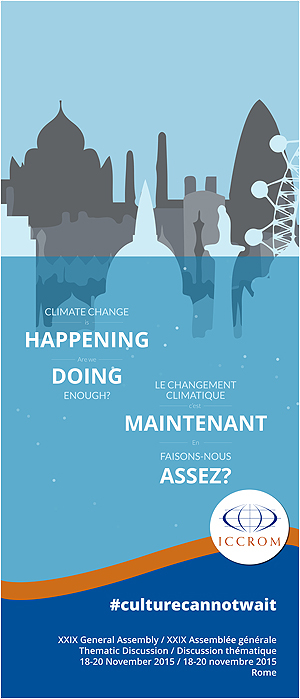Considerations from ICCROM’s 29th General Assembly
Nations of the world have been in Paris debating ways in which to tackle climate change and its impact, and how to commit to shared strategies and joint action. This challenge requires global vision and cooperation, and all sectors have a part to play. In this regard, heritage has an important contribution to make as a driver for sustainable societies and human development. ICCROM urges the cultural heritage sector in its Member States to engage actively in this effort.
At the ICCROM 29th General Assembly, a thematic discussion on “Climate Change, natural disasters and cultural heritage: Culture cannot wait!” highlighted the need to integrate cultural heritage in the global risk agenda as a vital resource for building back resilient communities. Keynote speaker Jerry Velasquez of the United Nations Office for Disaster Risk Reduction (UNISDR) outlined progress towards this end through the Sendai Framework. However, as threats due to extreme weather events increase, a key issue is the lack of data to estimate the extent and value of heritage losses.
Other contributions from invited speakers also showed how working closely with communities and grassroots initiatives can raise awareness with younger generations. For example, in the Philippines, climate change and disaster risk reduction are included in secondary school curricula.
The panel discussion also highlighted the need for concerted actions to safeguard cultural and natural heritage in disaster-prone countries such as India and Japan. Other examples of efforts to reduce the carbon footprint of cultural institutions and the use of historic buildings in climate change adaptation strategies also illustrated the potential of our sector to contribute towards positive change.
During their presentations, speakers made references to several online resources. We invite you to explore them, in the hope they may inspire you to take action and join the worldwide efforts.
List of the resources
- Sendai framework, The United Nations Office for Disaster Risk Reduction (UNISDR)
- UP DREAM Program. Disaster Risk and Exposure Assessment for Mitigation, University of the Philippines Training Center for Applied Geodesy and Photogrammetry (UP TCAGP), Philippines
- Project NOAH (Nationwide Operational Assessment of Hazards), Department of Science and Technology’s (DOST), Philippines
- dPlan: The Online Disaster-Planning Tool for Cultural and Civic Institutions, Northeast Document Conservation Center (NEDCC), United States
- Using GIS to Document Cultural Resources after a Natural Disaster, National Park Service, United States Department of the Interior, United States
- App: Emergency Response & Salvage Wheel, National Center for Preservation Technology and Training, United States Department of the Interior, United States
Watch the presentations on climate change made during the General Assembly
0:00 Thematic discussion – Keynote Speech on Climate Change and Natural Disasters by Jerry Velasquez, UNISDR
0:00 Thematic Discussion Panel and Debate on Climate Change and Natural Disasters: Culture Cannot Wait! (Introduction by Gunilla Lagnesjö and Marie Lavandier, ICCROM Council)
6:43 Institutional and Policy Frameworks for Climate Change, Disaster Risk Reduction and Cultural Heritage Management – Rohit Jigyasu, President of the ICOMOS International Scientific Committee on Risk Preparedness
18:42 Martin Frick, Director of Climate, Energy and Tenure Division at the UNFAO
27:47 Climate Change, Disaster Risk Reduction and Cultural Heritage: the Philippine Example – Virgilio A. Reyes Jr, ICCROM Council Member and former Philippine Ambassador to Italy
38:25 Climate Change and Disaster Response in the US National Park Service – Kirk Cordell, Executive Director of the National Center for Preservation Technology and Training, National Park Service, USA
58:23 Sustainable conservation on the way to the green museum – Stefan Simon, Director of the Institute for Preservation of Cultural Heritage, Yale University
1:10:33 Old buildings as recourses for sustainability and climate mitigation – Marte Boro, Senior Adviser at the Directorate for Cultural Heritage, Norway
1:22:42 Concluding Remarks – Jerry Velasquez, Director of Advocacy and Outreach, UNISDR

